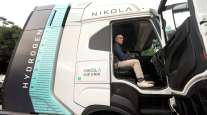Senior Reporter
Suppliers’ Input Helped Shape Nikola’s Class 8 Vision

SCOTTSDALE, Ariz. — The zero-emissions Class 8 models Nikola Motor Co. designed and is preparing to build reflect more than just a go-it-alone attitude by an entrepreneur with a vision of trucking’s clean future and the necessary infrastructure to support the trucks.
Indeed, Nikola’s Class 8s are taking shape after it sought, and received, valuable assistance and insights from a number of stellar suppliers of technologies or services.
“We recruited the best people to be our partners so they could help. And we could learn from the mistakes they have already learned [from],” Nikola CEO and founder Trevor Milton said April 16. He spoke as the latest versions of the company’s Nikola Two and Tre models were shown to fleets that have them on order, to potential investors in the company’s next round of funding, the media and others.

Trevor Milton in January by Nikola Corp.
Nikola has “hundreds of suppliers in total. Ten of them probably produce 90% of the parts, but a lot only deliver a single part,” Milton told TT.
Allan Wainscott, general manager of Thompson Truck Center, a unit of Thompson Machinery, remembers receiving a mass e-mail from Milton saying Nikola was looking at building a gas turbine electric truck.
That was in 2014. “Trevor wanted to use the Cat organization to be his service network. We put some figures together and had another meeting with him,” Wainscott said.
Thompson Machinery — a dealer for heavy-equipment manufacturer Caterpillar Inc. — became an early investor in Nikola, which has since moved to battery-electric and hydrogen fuel cell heavy-duty models and away from turbines.
“As an early investor, we wanted our territory as a Cat dealer to be protected, and to let us be the service and sales outlet in Tennessee and Mississippi,” he said. They have that territory now. Ryder System Inc. serves in that capacity elsewhere.
Thompson now consults with Nikola on “truck stuff. What does a trucker look for? The ergonomics of the truck,” said Wainscott, who has spent 43 years in the trucking industry.
PHOTO GALLERY: Images of Nikola Two, Nikola Tre and more
Thompson plans to cater to the truckload sector. Tennessee carriers such as U.S. Xpress and Covenant Transport Services already have ordered Nikola trucks, Wainscott said.
In the meantime, Nikola faces a couple of hurdles as it prepares for production, Wainscott said. The biggest one is getting the necessary U.S. Department of Transportation certifications.
“The insurance industry is also going to want to have some information on crash tests and rollovers. So that takes some time and there may be some delays. [Milton] has to go through that first to understand what he has to correct, if he has to correct anything,” Wainscott said.
Proud to be part of Nikola's ecosystem of suppliers and partners. We thoroughly enjoyed meeting our customers yesterday at #NikolaWorld2019. #NikolaTwo #MobilizingVehicleIntelligence pic.twitter.com/OYZmA0ZfRz — WABCO (@WABCO) April 18, 2019
Collin Shaw, director of marketing at Wabco North America, said the value of partnering with Nikola was to be able to put together the next type of braking system for North America.
There is regenerative braking on the Nikola trucks, but that doesn’t get drivers all of the needed braking force. “Maybe 30% to 40%,” he said.
In situations where you need more braking power, you must rely on the foundation brakes, too.
“What our system does with brake blending, is first to understand the amount of force being applied by regenerative braking. Then using the foundation brake to supplement that to supply the extra braking force,” Shaw said.
Meanwhile, Jason Roycht, vice president of commercial vehicles for Bosch North America, said Nikola was very open in seeking assistance. “We did all of the controls management, we helped them lay out the truck — implementing all of the building blocks of technology that are going to be necessary for the next 20 years in terms of computing power, secure communications and a high-efficiency powertrain.”
In cooperation with @nikolamotor, we have been developing the fuel cell powertrain for the new Nikola Two Alpha truck — complete with Bosch innovations such as Mirror Cam system and more: https://t.co/aZuLv2Eprl #eMobility — BoschGlobal (@BoschGlobal) April 18, 2019
Both companies have learned from the other, he said.
“We like low carbon dioxide solutions. It’s an opportunity for Bosch to supply a whole fuel-cell engine instead of just a couple of parts, here and there,” Roycht said.
Earlier, Meritor Inc. had been approached by three startup companies operating in a similar space as Nikola, but could not work with all of them, said Dave Damian, Meritor’s director of defense, who is knowledgeable about the Nikola trucks, too.
Meritor designed and developed the independent front and rear suspensions for the Nikola trucks. Traditional heavy-duty trucks have rigid-axle suspensions, he said.
You get much better ride-quality performance, among other benefits, out of a vehicle with independent suspensions, he said. “When you hit bumps, it sends less force and shock through the chassis and up into the driver’s seat.”
Meritor was able to apply some of the same technology it developed through its defense business, and working with Nikola wasn’t that different from joining a team that was seeking a military contract, Damian said.
“We saw a potential business opportunity. We liked the business model Trevor had put together,” he said. “We were able to strike a deal that worked for both companies.”




